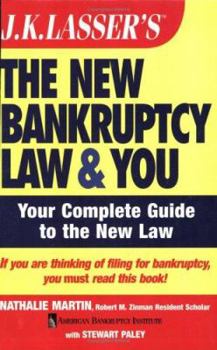J.K. Lasser's the New Bankruptcy Law and You
A comprehensive guide to the new bankruptcy law--and what it means for you Sweeping changes to U.S. bankruptcy law--the first major changes to the law in twenty- seven years--are occurring right now. If you're unfamiliar with the new bankruptcy law and how it could affect you, this book will quickly get you up to speed. While J.K. Lasser's The New Bankruptcy Law and You thoroughly covers this latest reform, along with its options and alternatives,...
Format:Paperback
Language:English
ISBN:0471753696
ISBN13:9780471753698
Release Date:October 2005
Publisher:John Wiley & Sons
Length:226 Pages
Weight:0.95 lbs.
Dimensions:0.7" x 9.1" x 6.1"
Customer Reviews
2 ratings
Very Good Bankruptcy Primer for Consumers!
Published by Thriftbooks.com User , 15 years ago
No book will make a consumer into an av-rated, board certified bankruptcy specialist overnight. Or even over weeks. That said, this book is a very good introduction to bankruptcy law for consumers. It discusses both Chapter 7 and Chapter 13 in some depth, and it has no obvious deficiencies. It's also a nice quick and easy read, partly because it's fairly short and well-organized. The New Bankruptcy Law and You also spends a good deal of time comparing and contrasting pre-2005 bankruptcy law to post-2005 bankruptcy law, and I'm not sure whether that's a feature or a flaw. It seems to me that a hypothetical reasonable consumer contemplating a bankruptcy of either common flavor (7 or 13; a Chapter 11 is available to individuals, but it's a post-graduate subject, and uncommon) would have little interest in the law that is no longer available to them. On the other hand, the use of the compare and contrast with the older law approach does provide a smooth framework for presenting the current version of the law. And since many people filed for bankruptcy prior to 2005, this book does a service to them and those who heard about their experiences by explaining just how much Congress made the process of consumer bankruptcy harder, more dangerous, more expensive, and less effective. As the book makes clear, the discharge in either a Chapter 13 or a Chapter 7 is still very valuable, and if you need it, the pain of the process is still worthwhile. But Congress certainly tinkered with the pain/value proposition of both common consumer bankruptcy chapters, and not in a way that was consumer-friendly. But if you need penicillin because you have pneumonia, you put up with the pain of the shot; and if you need to file a bankruptcy of either flavor because of overwhelming debt, you put up with the pain to get your fresh start. The tone of the book is one of its best features. The authors are clearly compassionate to the plight of debtors (the people who used to be called "bankrupts" under the much older version of the law); the authors are also clearly a little cranky with Congress for making honest debtors jump through so many more flaming hoops to obtain their discharge. Because the authors are experienced in bankruptcy law, they also know what to emphasize. For instance, the section on the full disclosure requirements is excellent, and includes this sentence: "If there are things in your financial life that you don't want anyone to find out about, please do not file a bankruptcy. If you fail to disclose something of significance, you can end up in jail." That's important for a debtor to hear, for obvious reasons, because it's the simple truth. But the thrust of the book is upbeat, and the prose is straightforward, non-technical and easy to read. I gave the book four stars instead of five because the exemptions section is obsolete, at least in Arizona where I practice, and I suspect elsewhere; that doesn't really make the book less valuable if yo
Good Book
Published by Thriftbooks.com User , 17 years ago
If you are considering personal bankruptcy, will satisfy the new means test or have a steady w-2 income you may want to file bankruptcy under Chapters 7 or 13. If you are considering one of the chapters, this is a great book for you. For businesses or individuals with more substantial assets or income, the appropriate Chapter would be Chapter 11. The books that I like on that subject are Chapter 11 Business Reorganizations: For Business Leaders, Accountants And Lawyers and Bankruptcy And Debtor/creditor: Examples And Explanations (Examples & Explanations)






